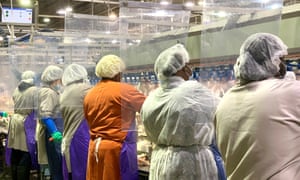When your health and possibly your life are on the line, a mere “thank you” from your employer won’t cut it. In an excellent blog post, Gregory Stine (gstine9) cites an article from The Fern reporting that as of May 1st, there have been 6,832 confirmed cases of coronavirus and at least 25 deaths among meatpacking and food processing workers across the country. This leaves me to wonder, is thousands of workers getting sick a business expense? Or did their employers make the age-old mistake of valuing profits over people, deciding that the costs of worker protections were simply too high. The question now – will they learn their lesson?
Gregory did a great job tying in what Michael Maniates’ piece, “Individualization”, taught us about the way in which large employers deflect responsibility for their own mistakes back onto the workers who suffer those mistakes’ consequences. This phenomenon has been especially evident during the pandemic. The New York Times reported how in a Tyson Foods pork plant that had over 1,000 confirmed cases, Tyson named “worker absenteeism” as a reason for having to temporarily shut down production, failing to recognize how their own practices had made going to work too dangerous for many of their workers.

A Tyson Foods factory in Waterloo, Iowa (Daniel Acker for The New York Times)
In Raj Patel’s “The Color of Food”, it was reported that food processing and meatpacking facilities across the country employ people of color at a disproportionate rate to the national population, as does every other sector of the food industry. Per the Food Workers Alliance, as well as being some of the most dangerous, 5 of the 8 lowest paying jobs in America are in the food system.

workers at a Tyson poultry plant in Georgia (Tyson/AP)
Gregory’s post emphasizes the pressing need for structural change that the pandemic has only helped illuminate. When the dust settles, will employers continue to disregard health concerns in the name of profits or will this mark the start of a new age of food worker safety and empowerment.

